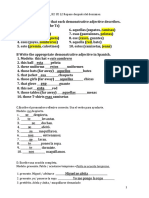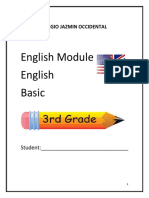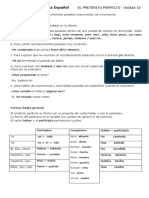Los Modales 3 PDF
Los Modales 3 PDF
Cargado por
Luis Enrique Stewie ApazaCopyright:
Formatos disponibles
Los Modales 3 PDF
Los Modales 3 PDF
Cargado por
Luis Enrique Stewie ApazaTítulo original
Derechos de autor
Formatos disponibles
Compartir este documento
Compartir o incrustar documentos
¿Le pareció útil este documento?
¿Este contenido es inapropiado?
Copyright:
Formatos disponibles
Los Modales 3 PDF
Los Modales 3 PDF
Cargado por
Luis Enrique Stewie ApazaCopyright:
Formatos disponibles
Los Modales (3)
Puede que … ( may, might)
En Inglés usamos may o might para expresar la probabilidad de que ocurra algo
en el futuro.
Ojo con la traducción. En español ambos verbos se suelen traducir por “puede que”
+ subjuntivo.
I. Con may la probabilidad es de alrededor del 50%
She may not like your present. Puede que a ella no le guste …
II. Con might la probabilidad es muy pequeña.
It might rain tomorrow. Puede que llueva mañana./ Podría llover
mañana.
Might también sirve para (i) hacer advertencias o (ii) expresar quejas.
i. Don’t drink and drive. You might have an accident. … Puede que tengas …
ii. You might tidy your room from time to time! ¡Podrías ordenar tu cuarto … !
May not no se contrae.
Ejercicio 1 Completa las oraciones con may o may not y los verbos
entre paréntesis.
1. __May I borrow__ (I / borrow) your dictionary?
2. I _______________ (go) to the concert but there _______________
(be) any tickets left.
3. She has not answered my messages. She _______________ (be) out of
town.
4. I’m tired today. I _______________ (stay) at home and watch a video.
5. The light is not on, so there _______________ (be) anybody inside.
6. I have studied hard, so I _______________ (pass) the test.
7. He speaks many languages, so he _______________ (get) the job.
8. My brother has been ill for a long time. Me _______________ (recover)
in time for my birthday.
1
Página
Ejercicios extraídos de la Gramática Oxford ESO.
Ejercicio 2 Completa las frases con might o might not y el verbo entre
paréntesis.
1. Accept their offer. __You might not get___ (get) a better opportunity.
2. I _________________ (buy) her this plant for her birthday. She likes
plants a lot.
3. Take a coat with you. It _________________ (be) cold this evening.
4. We _________________ (go) to Greece this summer, but we haven’t
booked anything yet.
5. I _________________ (go) by car because there will be a lot of traffic.
6. They _________________ (come) to the party tonight. They’re very
busy and they have a lot of things to do at home.
7. A: What are you doing tonight?
B: I’m not sure. I _________________ (stay) at home. I’m tired.
8. I know Jane is at school today. But I don’t know where she is at the
moment. She _________________ (be) in the gym or in the science lab.
9. Don’t worry too much about that mistake. It _________________ (be
important.
Ejercicio 3 Traduce las siguientes frases.
1. Puede que Sandra apruebe el examen.
_________________________________________________
2. Puede que él no coma carne.
_________________________________________________
3. Puede que haya1 un partido el domingo.
_________________________________________________
4. Podría ir a Argentina, pero puede que no tenga suficiente dinero.
_________________________________________________
5. Ella podría llegar muy pronto.
_________________________________________________
6. ¡Podrías llevarme a bailar2 de vez en cuando!
_________________________________________________
7. Puede que Ana no esté cansada.
_________________________________________________
8. Puede que ms padres me compren un iPod.
_________________________________________________
2
Página
1
Puede que haya: there might be
2
Llevarme a bailar: take me dancing
Ejercicios extraídos de la Gramática Oxford ESO.
También podría gustarte
- Ejercicios Con Los Verbos Terminados en ARDocumento2 páginasEjercicios Con Los Verbos Terminados en ARVeronica Farfus75% (8)
- Arriba Comunicacion y Cultura 6th Edition Zayas-Bazan Test Bank DownloadDocumento17 páginasArriba Comunicacion y Cultura 6th Edition Zayas-Bazan Test Bank DownloadAlice Ascencio100% (22)
- Cuadernillo-de-trabajo-para-Junio-Julio-1°-Secundaria Regularizacion-y-ExamenDocumento12 páginasCuadernillo-de-trabajo-para-Junio-Julio-1°-Secundaria Regularizacion-y-ExamenVioleta Sotelo CanoAún no hay calificaciones
- Prueba de Nivel InglesDocumento7 páginasPrueba de Nivel InglesSebastián HeimdallAún no hay calificaciones
- La Vida de EnocDocumento3 páginasLa Vida de EnocSelvin Sosa100% (1)
- ModalsDocumento2 páginasModalsYisel Castillo AngelesAún no hay calificaciones
- Español PretéritosDocumento15 páginasEspañol PretéritosolsatalleresAún no hay calificaciones
- Verbos ModalesDocumento3 páginasVerbos ModalesAngelicaRubioAún no hay calificaciones
- 1 Parcial Ingles 3Documento8 páginas1 Parcial Ingles 3Sarah Guzman100% (1)
- Unit 8 2º EsoDocumento5 páginasUnit 8 2º EsokittycowAún no hay calificaciones
- 2 Parcial Ingles 3Documento7 páginas2 Parcial Ingles 3Sarah GuzmanAún no hay calificaciones
- Cuadernillo 3 Ejercicios 2017Documento72 páginasCuadernillo 3 Ejercicios 2017Cesar Augusto Rodriguez MartinezAún no hay calificaciones
- Guia Tercer Periodo - NovenoDocumento10 páginasGuia Tercer Periodo - NovenoAndrea GalloAún no hay calificaciones
- Subjuntivo PasadoDocumento2 páginasSubjuntivo PasadoChiara Di CaprioAún no hay calificaciones
- SÉPTIMO PLAN DE MEJORAMIENTO INGLÉS 2024Documento6 páginasSÉPTIMO PLAN DE MEJORAMIENTO INGLÉS 2024DIEGO GEOVANNI ASTROZ GARCIAAún no hay calificaciones
- Antologia InglesDocumento38 páginasAntologia InglesYo RkAún no hay calificaciones
- Present SimpleDocumento2 páginasPresent SimpleLeyre SobejanoAún no hay calificaciones
- Institución Educativa Técnica Villa Olímpica: Guía de Aprendizaje Inetvol No. - 6Documento7 páginasInstitución Educativa Técnica Villa Olímpica: Guía de Aprendizaje Inetvol No. - 6Yalilis RodríguezAún no hay calificaciones
- Repaso de Gramática - Seconda MediaDocumento7 páginasRepaso de Gramática - Seconda MediaLola MentoAún no hay calificaciones
- Inglés Iv Antología 2Documento31 páginasInglés Iv Antología 2Luz AirAún no hay calificaciones
- El Futuro Compuesto - Teoria y EjerciciosDocumento6 páginasEl Futuro Compuesto - Teoria y EjerciciosAndreaDiazAún no hay calificaciones
- Ejercicios de PreparaciónDocumento9 páginasEjercicios de PreparaciónFelipe González AhumadaAún no hay calificaciones
- Plan de Mejoramiento Freddy Grado Undecimo 2020 AbrilDocumento5 páginasPlan de Mejoramiento Freddy Grado Undecimo 2020 AbrilfrepovaAún no hay calificaciones
- G9 1 4.3 Futuro Imperfecto Hoja de Ejercicios PDFDocumento4 páginasG9 1 4.3 Futuro Imperfecto Hoja de Ejercicios PDFLiliana SanchezAún no hay calificaciones
- Hoja de Repaso 2Documento6 páginasHoja de Repaso 2J CSAún no hay calificaciones
- Repaso de Gramática - PRIMA MEDIADocumento5 páginasRepaso de Gramática - PRIMA MEDIALola MentoAún no hay calificaciones
- Capítulo 5 REPASO: Nombre - La FechaDocumento3 páginasCapítulo 5 REPASO: Nombre - La Fechaapi-26007136Aún no hay calificaciones
- Verbs: Presente ContinuoDocumento18 páginasVerbs: Presente ContinuoSara Belén CamachoAún no hay calificaciones
- U2 L2 Review After Break H2 KEY-1Documento6 páginasU2 L2 Review After Break H2 KEY-1llayaAún no hay calificaciones
- Regalos AlumnosDocumento12 páginasRegalos AlumnosSara AraujoAún no hay calificaciones
- ESTAR GerundioDocumento2 páginasESTAR GerundionixonAún no hay calificaciones
- Combinaciones GramaticalesDocumento4 páginasCombinaciones GramaticalesInti S100% (1)
- Alevel Grammar Pruebas QuestionsDocumento29 páginasAlevel Grammar Pruebas QuestionsPooAún no hay calificaciones
- 02 Presente de Subjuntivo EjerciciosDocumento4 páginas02 Presente de Subjuntivo EjerciciosVictor Mory100% (2)
- Los Modales 4Documento2 páginasLos Modales 4paku_solAún no hay calificaciones
- Práctica Combinaciones Gramaticales Rolo Mes JunioDocumento4 páginasPráctica Combinaciones Gramaticales Rolo Mes JunioDmenteccc Lucha100% (1)
- Guía de Aprendizaje Tecnólogos Adaptación VirtualDocumento16 páginasGuía de Aprendizaje Tecnólogos Adaptación Virtualnorelis quinteroAún no hay calificaciones
- Verbo Sustantivos Talleres LecturasDocumento13 páginasVerbo Sustantivos Talleres LecturasIng.Jamie MackliffAún no hay calificaciones
- Taller 8 IP 2017Documento15 páginasTaller 8 IP 2017Rubén DaríoAún no hay calificaciones
- El SubjuntivoDocumento6 páginasEl SubjuntivoDarinca DíazAún no hay calificaciones
- Simple Present Affirmative FormDocumento11 páginasSimple Present Affirmative FormKorina D DyOsAún no hay calificaciones
- Examen Unidad 2Documento3 páginasExamen Unidad 2Sandra LazovskaAún no hay calificaciones
- SP Exam 1Documento3 páginasSP Exam 1angelmdiazAún no hay calificaciones
- Grado 11 - Ingles - Héctor Guillermo Burbano - Guía 5 2021 Grado OnceDocumento7 páginasGrado 11 - Ingles - Héctor Guillermo Burbano - Guía 5 2021 Grado OnceAlejo GBAún no hay calificaciones
- Unidad 6Documento15 páginasUnidad 6Elder CamposAún no hay calificaciones
- Practica 5Documento5 páginasPractica 5Albert Ruiz0% (1)
- Present Continuous 2 Gonzalo OrozcoDocumento3 páginasPresent Continuous 2 Gonzalo OrozcoMiriam ChiovettaAún no hay calificaciones
- Ficha 1 - Ua5 How To Survive. - Inglés 5toDocumento4 páginasFicha 1 - Ua5 How To Survive. - Inglés 5toPilar TasaicoAún no hay calificaciones
- Handout English Unit 2 PDFDocumento34 páginasHandout English Unit 2 PDFedwin chavez davilaAún no hay calificaciones
- Futuro Perfecto de IndicativoDocumento2 páginasFuturo Perfecto de IndicativoninjitisuAún no hay calificaciones
- Modulo 3eroDocumento54 páginasModulo 3eroMc Mac TeachAún no hay calificaciones
- Repaso - Examen FinalDocumento4 páginasRepaso - Examen FinalJosé Ramón OrtigasAún no hay calificaciones
- Nivelación Segundo Trimestre Grado OnceDocumento2 páginasNivelación Segundo Trimestre Grado OnceDaniel MaldonadoAún no hay calificaciones
- Un. 13 - EL PRETÉRITO PERFECTODocumento3 páginasUn. 13 - EL PRETÉRITO PERFECTONelton CostaAún no hay calificaciones
- Taller InglesDocumento5 páginasTaller InglesJuan Humanez PosadaAún no hay calificaciones
- Evaluación EspanholDocumento5 páginasEvaluación EspanholVeronica FarfusAún no hay calificaciones
- SP2024 FINAL EXAM Chapter 8 Review and Sample ActivitiesDocumento9 páginasSP2024 FINAL EXAM Chapter 8 Review and Sample Activitiesjngz5ksywcAún no hay calificaciones
- Actividad 2 Presente Continuo-Nubia G.Documento2 páginasActividad 2 Presente Continuo-Nubia G.Andrea GalloAún no hay calificaciones
- Ejercicios - Pretérito Perfecto e IndefinidoDocumento3 páginasEjercicios - Pretérito Perfecto e Indefinidoricael.rochaAún no hay calificaciones
- Inglés exprés: Cómo evitar los errores más frecuentesDe EverandInglés exprés: Cómo evitar los errores más frecuentesCalificación: 4 de 5 estrellas4/5 (1)
- Inglés: Ejercicios prácticos para escribir y hablar fácilmenteDe EverandInglés: Ejercicios prácticos para escribir y hablar fácilmenteCalificación: 5 de 5 estrellas5/5 (1)
- Luis Alberto Tejada Rivera - VIDEO DE ANALISISDocumento2 páginasLuis Alberto Tejada Rivera - VIDEO DE ANALISISLuis Enrique Stewie ApazaAún no hay calificaciones
- Technology RulesDocumento4 páginasTechnology RulesLuis Enrique Stewie ApazaAún no hay calificaciones
- TrabajohuamaniDocumento4 páginasTrabajohuamaniLuis Enrique Stewie ApazaAún no hay calificaciones
- Cm3 HRDocumento1 páginaCm3 HRLuis Enrique Stewie ApazaAún no hay calificaciones
- CalcosinaDocumento2 páginasCalcosinaLuis Enrique Stewie Apaza100% (1)
- Triptico Papa PapaDocumento2 páginasTriptico Papa PapaLuis Enrique Stewie ApazaAún no hay calificaciones
- Ejercicio 7 Transferencia de CalorDocumento3 páginasEjercicio 7 Transferencia de CalorLuis Enrique Stewie ApazaAún no hay calificaciones
- Cobalto PDFDocumento25 páginasCobalto PDFLuis Enrique Stewie ApazaAún no hay calificaciones
- El Hombre de La Mano Seca Mateo 12Documento3 páginasEl Hombre de La Mano Seca Mateo 12David zamoraAún no hay calificaciones
- Reseñas, Irene TournéDocumento5 páginasReseñas, Irene TournéGTAún no hay calificaciones
- Si Tu Hermano Peca, Ve y Corrígelo en PrivadoDocumento4 páginasSi Tu Hermano Peca, Ve y Corrígelo en PrivadoAna SánchezAún no hay calificaciones
- Clase Vii Mapa Geologico Geotecnico Parte 2Documento14 páginasClase Vii Mapa Geologico Geotecnico Parte 2Jns GasparAún no hay calificaciones
- Caso Disney. Claudia y WillyDocumento7 páginasCaso Disney. Claudia y WillyClaudia CornejoAún no hay calificaciones
- Literatura MedievalDocumento39 páginasLiteratura MedievalLucas Conforti ProttiAún no hay calificaciones
- Clasificación de Los VersosDocumento6 páginasClasificación de Los VersosSONIA ISABEL FLORES50% (2)
- El Hombre Sin Cabeza - Ricardo MariñoDocumento7 páginasEl Hombre Sin Cabeza - Ricardo Mariñoveronica curi0% (1)
- GAYUN (Reparado)Documento32 páginasGAYUN (Reparado)David EscobedoAún no hay calificaciones
- Prueba La Cuncuna FilomenaDocumento4 páginasPrueba La Cuncuna FilomenaPaola Narbona C.Aún no hay calificaciones
- El Tribalismo - MaffesoliDocumento34 páginasEl Tribalismo - MaffesoliJohn Jairo OrozcoAún no hay calificaciones
- Elementos de La Optica GeometricaDocumento28 páginasElementos de La Optica GeometricaRonald PillajoAún no hay calificaciones
- Comandos Abreviados de AutoCADDocumento1 páginaComandos Abreviados de AutoCADMarco Linares OrtegaAún no hay calificaciones
- Homilia 12052021Documento2 páginasHomilia 12052021Víctor Alonso Huerta PalomeraAún no hay calificaciones
- Una Entrevista Inédita A Javier VillafañeDocumento5 páginasUna Entrevista Inédita A Javier VillafañebibliotecaedaicAún no hay calificaciones
- Asignatura Sentido de VidaDocumento4 páginasAsignatura Sentido de VidaHernando Walter Prieto RincónAún no hay calificaciones
- Sintaxis VisualDocumento29 páginasSintaxis VisualDanielMuñoz100% (1)
- En Que Consiste El Efecto TermoiónicoDocumento8 páginasEn Que Consiste El Efecto TermoiónicoAle Repi0% (1)
- Apuntes y Actividades ANÁLISIS SINTÁCTICODocumento4 páginasApuntes y Actividades ANÁLISIS SINTÁCTICOArantza Gondra BasterretxeaAún no hay calificaciones
- Guias Periodo 1 Mat 9.2Documento12 páginasGuias Periodo 1 Mat 9.2María Camila García OrtegaAún no hay calificaciones
- Índices NarrativosDocumento2 páginasÍndices NarrativosMarioPalacioGuerreroAún no hay calificaciones
- Cultura Material Domestica Burguesa Argentina 1860 1914 Parte IxDocumento107 páginasCultura Material Domestica Burguesa Argentina 1860 1914 Parte IxAnonymous AEmBWFu3100% (1)
- María Tuvo Más HijosDocumento7 páginasMaría Tuvo Más HijosKatty MartinezAún no hay calificaciones
- Elaboracion de PerfumesDocumento5 páginasElaboracion de PerfumesStalin Zambrano100% (1)
- Portafolio Artista Luis Ernesto Solorio ParedesDocumento18 páginasPortafolio Artista Luis Ernesto Solorio ParedesCentro Cultural de España en LimaAún no hay calificaciones
- Porta Folio Libros Manuel T ZocDocumento10 páginasPorta Folio Libros Manuel T ZocManuel Gabriel Tzoc BucupAún no hay calificaciones
- Clei 3Documento2 páginasClei 3joseabigailAún no hay calificaciones
- Curso de Tarot Por Jorge Diaz Crespo Vidente Sensitivo Parte 3Documento3 páginasCurso de Tarot Por Jorge Diaz Crespo Vidente Sensitivo Parte 3Jorge Diaz Crespo Vidente SensitivoAún no hay calificaciones
- José Emilio PachecoDocumento5 páginasJosé Emilio PachecoOsiel HernandezAún no hay calificaciones

































































































